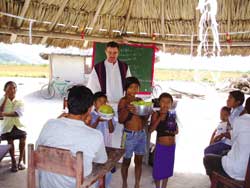The sweet and the bitter
It is a privilege to walk with the gentle Makuxi people of northern Brazil and to share their laughter and their pain
By Fr. Ron MacDonell, SFM
January 2004
Return to Table of Contents
Print Article
The Brazilians have a saying: "a vida é uma mistura fina, com doce e amargo" (life is a delicate mixture, with the sweet and the bitter). Indeed, that is my experience here as a missionary priest among the Makuxi (mak koo SHEE) people of northern Brazil. I feel the bitterness each day.

Offertory of local products by children of the community, as Fr. Ron MacDonell celebrates Mass in Japó village. Brazil.
Photo Credit: Bev Trach
For over 30 years, the Makuxi have been struggling to gain control of their ancestral lands, marked off as the Raposa/Serra do Sol Reserve. Most of the cattle ranchers who invaded Makuxi lands have left, compensated by the federal government. Recently, however, huge rice-growing operations have been set up inside the borders of Makuxi lands. One village leader told me that a rice-grower and his workers arrived in the village, threatening to kill the leader if he resisted their presence.
Stories like this chill me. There are individuals who are ready to kill innocent people in order to make money. Because we support native rights, Scarboro missionaries here are regarded with suspicion by the land invaders. We live in a climate of tension.
The bitterness of life is also caused by an internal demon of the Makuxi communities: alcoholism. I have sat through many meetings, listening to the complaints of the community regarding the drinking. I have heard the despair in the voices of women who talk of their husbands' dependence on alcohol, of how their children go hungry because the men do not fish or work in the manioc fields. It is a vicious circle: the men drink to numb the pain of poverty, but the drinking only worsens the poverty.
Sickness is rampant in the villages. Safe drinking water is rare, and the Makuxi often succumb to amoebic dysentery and other intestinal diseases. We missionaries also share this ordeal, as it is not always possible to control our water supply. A few months ago, I came down with an intestinal infection – fever, diarrhea and dizziness. Twenty others in the village suffered from it, too. We later found out that there were mangos rotting in the village water tank. Those responsible for cleaning the tank were lax in their job.
But life is not all bitter. The good moments of sweetness and joy far outnumber whatever difficulties come our way. The Makuxi are a gentle, friendly people. Time slows down in the Makuxi world and conversing with people becomes an art. We often gather under a mango tree, or on a bench outside a thatched house, chatting and sharing news.
I love the sounds of the Makuxi language, the way they joke around, their sense of humour. There is lots of laughter and much love shared.
Here on the dusty, sun-beaten plains of Roraima, we are surrounded by the sweetness of nature: the canopy of stars at night and the spectacular sunrises, the many birds whose song fills the air, and the exotic butterflies and insects. There is always some new, intriguing aspect of nature to appreciate.
I also feel the sweetness of life in the deep religiosity of the people. As a priest, I am privileged to celebrate the Sacraments with many Makuxi communities, and I am always struck by the deep reverence with which the people participate in the Sacraments. The Makuxi are famous for their gift of music, and our celebrations are usually filled with song, accompanied by guitars and drums.
After each visit to a village, some refrain usually repeats itself in my head, like a mantra, reminding me that despite the hardships, there is always joy. Life is, indeed, a delicate mixture of the bitter and the sweet.
After completing his doctorate in linguistics at McGill University, Fr. Ron MacDonell has returned to mission in Brazil working with Native languages.
Return to Table of Contents
Print Article